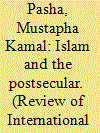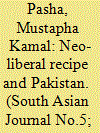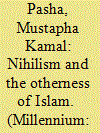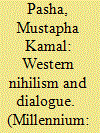|
|
|
Sort Order |
|
|
|
Items / Page
|
|
|
|
|
|
|
| Srl | Item |
| 1 |
ID:
175168


|
|
|
|
|
| Summary/Abstract |
This article probes the promises and anomalies of a new universalism proposed by Dipesh Chakrabarty as an apparent retort to the challenge of the Anthropocene. Revising established understandings of temporality and human agency imagined within modernity, the new universalism depicts a radically different horizon shaped by interconnections produced by the subsumption of human history into natural history. A key element of Chakrabarty’s new universalism is his dramatic repudiation of the reputed postcolonial claim of difference which hurriedly dissolves the afterlife and persistence of coloniality on a global scale in favour of a yet-to-be-forged planetary consciousness. Chakrabarty’s new universalism raises profound questions for rethinking International Relations (IR). However, without due cognisance of sedimented difference, Chakrabarty ends up reciting the secular-liberal story of one-world universalism. It is argued here that a differentiated universalism organised around the notion of human finitude can simultaneously attend to postcolonial concerns and the challenge of the Anthropocene.
|
|
|
|
|
|
|
|
|
|
|
|
|
|
|
|
| 2 |
ID:
089813


|
|
|
|
|
| Publication |
2009.
|
| Summary/Abstract |
Islamic exceptionalism (IE), or the discourse of Islam's inassimilable difference, legitimizes post-9/11 encounters with Islam and strategies of political and cultural domestication of the Islamic cultural zones (ICZs). It may also furnish new grounds for exclusions, enclosures and securitization. The aim of this paper is to explore the principal vectors of the field of vision generated by IE; to draw out any possible connections between IE and a presumed global exception (GE); and more broadly, to delineate how IE speaks to the perils of International Relations (IR)'s occlusion of the political in ICZs. In exploring the nexus between IE and GE, both the recursive character of GE and its constraints are noted, with an appreciation of cultural mappings nourishing GE. The key implication drawn is the need to avoid the temptation of an abstract notion of GE without ample recognition of its particularized instantiations, notably in reference to Islam.
|
|
|
|
|
|
|
|
|
|
|
|
|
|
|
|
| 3 |
ID:
117461


|
|
|
|
|
| Publication |
2012.
|
| Summary/Abstract |
The language of the 'postsecular' acknowledges the enduring presence of faith in politics, repudiating secularisation theses claiming diminution or privatisation of religion in social and political life. In cognitive and experiential worlds, those presumably unfettered by these conceptions (for example, the Islamic Cultural Zones or ICZs), the postsecular presents a different order of challenge and possibility. The term ICZs refers to Muslim majority areas informed by transnational subjectivities loosely connecting varied Islamic societies around symbolic commonality, memory, and historical experience. The term stresses the plurality of Islamic cultural experience, albeit distinguished by recognisable semiotic markers, without essentialising Islamic identity. This article questions the hegemonic view pervasive in both secular and postsecular theorising of the fiction of immutability of faith in the ICZs and recognises its rupture and displacement under conditions of late modernity. The ontological dislocation in the character of religion itself under conditions of late modernity opens up the possibility to account for the assumed resistance of Islam to secular modernity, but also to explain Islam's imbrications in politics read under the sign of Political Islam. Paradoxically, under the condition of late modernity, a more homogenised Islam appears to crystallise in the ICZs at odds with an 'open' Islam.
|
|
|
|
|
|
|
|
|
|
|
|
|
|
|
|
| 4 |
ID:
052718


|
|
|
|
|
| Publication |
Jul-Sep 2004.
|
|
|
|
|
|
|
|
|
|
|
|
|
|
|
|
| 5 |
ID:
124626


|
|
|
|
|
| Publication |
2013.
|
| Summary/Abstract |
The 'death of God' remains a recognisable frame to approach Western cultural malaise captured in its nihilism. Removed from this spatio-temporal horizon, however, claims of fin de siècle appear partial, provincial, and extraneous. For worlds 'outside' the West, the idea of the death of God is an absurdity, excessive and irrelevant. Viewed from relativist positionality, God's demise presents as a strictly Western problem. On the other hand, nihilism is neither a culturally restricted state nor a unique property of Western self-annihilating proclivities. This paper explores the assumed 'Otherness' of Islam in its encounter with nihilism, especially in reference to the question of political violence. Distinction between life-affirming and life-negating impulses of political violence helps situate religiously coded violence and the nihilistic violence of modernity. In the case of Islamic violence, it is argued, this distinction is often blurred. The paper maps out the cosmological basis of Islamic alterity, one that is increasingly tested under conditions of globalising modernity and its pathologies.
|
|
|
|
|
|
|
|
|
|
|
|
|
|
|
|
| 6 |
ID:
153666


|
|
|
|
|
| Summary/Abstract |
This article questions recent critiques of Eurocentrism for silencing religion in favour of either culture or race. Quite ironically, these critiques draw from a Eurocentric spatio-temporal horizon embedded in Enlightenment thinking. A crucial element of that horizon is a tacit acceptance of secularity as the ontological condition of differentiation, reflected in wholescale acknowledgement of the ascendancy of Scientific Racism and the displacement of religiosity. International practice increasingly manifests the confluence of religion and race and the difficulty of separating the two in explaining processes of differentiation and exclusion. Without adequate recognition of religion in critiques of Eurocentrism and sufficient appreciation of race in postsecular theorisation, the two frames of capture are likely to remain apart. In the first instance, critiques of Eurocentrism in IR cannot pretend to fully disown Enlightenment’s spatio-temporal horizon whilst wedded to its secular commitments. In the second instance, postsecular thinking risks reproducing its own version of Eurocentrism without recognising race as a crucial marker of differentiation, not reducible to religious difference. A dialogical encounter and convergence between the two registers of critique can provide new openings for understanding.
|
|
|
|
|
|
|
|
|
|
|
|
|
|
|
|
| 7 |
ID:
105929


|
|
|
|
|
| Publication |
2011.
|
| Summary/Abstract |
Recognition of other cultural mappings and sensitivities can facilitate meaningful dialogue in International Relations. On this assurance, the naturalised history of the discipline becomes more susceptible to rival accounts that materialise in other locales. Limits to dialogue, however, are internal to International Relations, a product of particular histories and settlements. This article probes some of the limits imposed by the spectres of nihilism on International Relations as theory and practice. These limits originate principally from the repudiation of Transcendence and the collapse of Western metaphysics as well as the imposition of a framework of 'post-politics' drawn from reading obituaries of the death of the liberal modern Western subject worldwide.
|
|
|
|
|
|
|
|
|
|
|
|
|
|
|
|
|
|
|
|
|